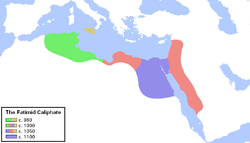Fatimides
| Fatimid Islamic Caliphate | ||||||||||||||||||||||||
|
الدولة الفاطمية ad-Dawlah al-Fāṭimiyya |
||||||||||||||||||||||||
|
||||||||||||||||||||||||
| Capital |
|
|||||||||||||||||||||||
| Languages |
Arabic (Dominant and spoken Language) Judeo-Arabic (Arabic language with Hebrew characters) Berber African Latin |
|||||||||||||||||||||||
| Religion | Ismaili Shia Islam | |||||||||||||||||||||||
| Government | Caliphate | |||||||||||||||||||||||
| Caliph | ||||||||||||||||||||||||
| • | 909–934 (first) | al-Mahdi Billah | ||||||||||||||||||||||
| • | 1160–1171 (last) | al-'Āḍid | ||||||||||||||||||||||
| Historical era | Early Middle Ages | |||||||||||||||||||||||
| • | Established | 5 January 909 | ||||||||||||||||||||||
| • | Foundation of Cairo | 8 August 969 | ||||||||||||||||||||||
| • | Disestablished | 1171 | ||||||||||||||||||||||
| Area | ||||||||||||||||||||||||
| • | 969 | 4,100,000 km2 (1,600,000 sq mi) | ||||||||||||||||||||||
| Currency | Dinar | |||||||||||||||||||||||
|
||||||||||||||||||||||||
The Fatimid Caliphate (Arabic: الفاطميون, al-Fāṭimīyūn) was an Ismaili Shia Islamic caliphate that spanned a large area of North Africa, from the Red Sea in the east to the Atlantic Ocean in the west. The dynasty ruled across the Mediterranean coast of Africa and ultimately made Egypt the centre of the caliphate. At its height the caliphate included in addition to Egypt varying areas of the Maghreb, Sudan, Sicily, the Levant, and Hijaz.
The Fatimids claimed descent from Fatima bint Muhammad, the daughter of Islamic prophet Muhammad. The Fatimid state took shape among the Kutama Berbers, in the West of the North African littoral, particularly Algeria, in 909 conquering Raqqada, the Aghlabid capital. In 921 the Fatimids established the Tunisian city of Mahdia as their new capital. In 948 they shifted their capital to Al-Mansuriya, near Kairouan in Tunisia. In 969 they conquered Egypt and established Cairo as the capital of their caliphate; Egypt became the political, cultural, and religious centre of their empire. The Fatimid caliphate was distinguished by the central role of Berbers in its initial establishment and in helping its development, especially on the military and political levels.
...
Wikipedia

